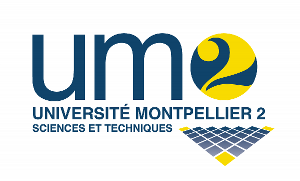External links
- Official website Archived 9 May 2012 at the Wayback Machine
The Institut national de recherche en sciences et technologies pour l'environnement et l'agriculture (French pronunciation: [ɛ̃stitynɑsjɔnaldəʁəʃɛʁʃɑ̃sjɑ̃setɛknɔlɔʒipuʁlɑ̃viʁɔnmɑ̃elaɡʁikyltyʁ] ; "National Institute of Scientific and Technological Research for Environment and Agriculture"; IRSTEA), formerly known as Cemagref, was a public research institute in France focusing on land management issues, such as water resources and agricultural technology. From 1 January 2020 the IRSTEA merged with the INRA (Institut national de la recherche agronomique) to create the INRAE (Institut national de recherche pour l'agriculture, l'alimentation et l'environnement). [1]
IRSTEA/Cemagref had an annual operating budget of €81.6 Million in 2011, and employed nearly 1350 staff, including 950 permanent staff, others being graduate students, 200 doctoral candidates, interns and foreign researchers. About 250 master-degree trainees contributed also to some of its activities.
There were 9 research sites containing a total of 29 research units. In addition to published research, the institute collaborates with other research organizations and took in a portion of its income from contract work. [2]
IRSTEA is a member of the UniverSud Paris.
Irstea collaborated in a number of other research networks, including European Network of Freshwater Research Organisations (EurAqua), the Partnership for European Environmental Research (PEER), European network for testing of agricultural machines (ENTAM), and the European Network of Engineering for Agriculture and Environment (ENGAGE). [3]

The French Alternative Energies and Atomic Energy Commission, or CEA, is a French public government-funded research organisation in the areas of energy, defense and security, information technologies and health technologies. The CEA maintains a cross-disciplinary culture of engineers and researchers, building on the synergies between fundamental and technological research.
The École Nationale Supérieure des Industries Agricoles et Alimentaires, or ENSIA, was a French grande école of agriculture, located in Massy, near Paris. It was affiliated to the Ministry of Agriculture. The school was founded in 1893 and merged into AgroParisTech in 2006.

Montpellier 2 University was a French university in the académie of Montpellier. It was one of the three universities formed in 1970 from the original University of Montpellier. In January 2015, Montpellier 1 University and Montpellier 2 University merged to form the University of Montpellier.
AgroParisTech is a French higher education institution, known as a grande école. It is a constituent member of the Paris-Saclay University. It was founded on January 1, 2007, by the merger of three life sciences grandes écoles.

University of Versailles Saint-Quentin-en-Yvelines is a French public university created in 1991, located in the department of Yvelines and, since 2002, in Hauts-de-Seine. It is a constituent university of the federal Paris-Saclay University.
The University of Lille Doctoral College, formerly the European Doctoral College Lille Nord-de-France, is part of the University of Lille since the dissolution of the Community of Universities and Institutions Lille Nord de France in 2019.

The Community of Universities and Institutions (COMUE) Lille Nord de France was a French Groups of Universities and Institutions (COMUE) spread over multiple campuses and centered in Lille. It included a European Doctoral College and federated universities, engineering schools and research centers. With more than one hundred thousand students, it was one of the largest university federations in France. The University of Lille, with nearly 70,000 students, was its main component. The COMUE stopped its activity in 2019 and its activities were transferred to its founding institutions.
A Public Scientific and Technical Research Establishment is a category of public research institutes. In France, they were authorized by Law No. 82-610 of 15 July 1982. In Algeria, they were authorized by decree No. 99-256 of 16 November 1999.
Animal: An International Journal of Animal Bioscience is an academic journal established February 2007 and published monthly by Cambridge University Press.

The Institut national de la recherche agronomique was a French public research institute dedicated to agricultural science. It was founded in 1946 and is a Public Scientific and Technical Research Establishment under the joint authority of the Ministries of Research and Agriculture. From 1 January 2020 the INRA merged with the IRSTEA to create the INRAE.

The University of Lorraine, abbreviated as UL, is a public research university based in Lorraine, Grand Est region, France. It was created on 1 January 2012, by the merger of Henri Poincaré University, Nancy 2 University, Paul Verlaine University – Metz and the National Polytechnic Institute of Lorraine (INPL). It aimed to unify the main colleges of the Lorraine region. The merger process started in 2009 with the creation of a Pôle de recherche et d'enseignement supérieur (PRES) and was completed in 2012.

Sylvie Faucheux is a French professor, specializing in the economy of the natural environment and sustainable development. President of the Versailles Saint-Quentin-en-Yvelines University (UVSQ) from 2002 till April 2012, she is the current president of Université du grand ouest parisien, Professor at the French National Conservatory of Arts and Crafts from 2014 until 2017, and was Director of Academic Research and Innovation at the Research Centre of INSEEC from 2017 until 2022.
An établissement public à caractère administratif is, in France, a public law legal person with a certain administrative and financial autonomy to fulfil a mission of public interest under the control of the State or a local authority.
The French Agricultural Research Centre for International Development (CIRAD) is a French agricultural research and international cooperation organization working for the sustainable development of tropical and Mediterranean regions. It is a public industrial and commercial establishment (EPIC) founded in 1984, with its Head Office in Paris.

Located within the Cité lyonnaise de l’environnement et de l’analyse, the Institute of Analytical Sciences is a French research, training and expertise center specializing in analytical chemistry. It is a Joint Research Unit affiliated with the National Centre for Scientific Research (CNRS), Claude Bernard University Lyon 1, and École normale supérieure de Lyon.
Veterinary Research is an international open access journal focusing on animal infectious diseases. Veterinary Research publishes original papers and reviews on host-pathogen interactions. Thematics are bacteriology, epidemiology, immunology, parasitology, prion diseases and virology.
Genetics Selection Evolution(known as GSE, and abbreviated with Genet. Sel. Evol.) is a bimonthly online-only peer-reviewed scientific journal covers original research on all aspects of genetics and selection in domestic animal species and other species providing results of immediate interest for farm animals' genetics.
Michel Caboche , was a French biologist, director of research at Institut national de la recherche agronomique (INRA), member of the French Academy of Sciences and of the Scientific Council of the Parliamentary Office for the Assessment of Scientific and Technological Choices (OPECST).

Populiculture is the name given to various types of cultivation in artificial poplar stands, on the fringe between agriculture and forestry. Its manager is called a "poplar farmer".

The Institut Agro or National Institute of Higher Education for Agriculture, Food and the Environment is a French public scientific, cultural and professional establishment (EPSCP), a Grands établissements created on January 1, 2020.